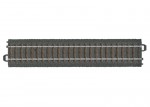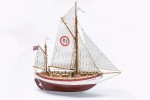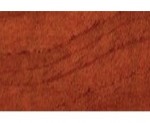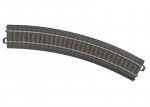Build the redesigned 1:50 scale model in wood of the Marie Jeanne, the precious and traditional French tuna boat. This renewed wooden model ship kit is aimed at those who have an intermediate level of basic knowledge of tools and materials, as well as those who want a first contact with rigging tasks.
The tuna boat model kit Marie Jeanne brings high quality parts for its assembly, they fit perfectly: pre-cut board by high precision laser, hardwoods, photo-etched parts, brass and die-cast, plus hand-sewn cotton sails ready to be placed. As a bonus, this naval modeling kit includes a wooden exhibition base with a metal name plate so that the faithful miniature replica is perfectly exposed once assembled.
The modeler can enjoy a much more enjoyable and easy assembly experience with this new scale model. Once assembled, the Marie Jeanne wooden model measures 22.24'' (565 mm) length, 4.52'' (115 mm) width and 19.48'' (495 mm) height.
Guided by our renewed and highly detailed step-by-step multimedia instructions on DVD format for computers -PC & MAC-, modelers can now precisely build their replica of this marvelous Gallic fishing boat. No printed instructions are included. You can also download the digital instructions for free on the button of this product sheet called 'Instructions and Downloadable Contents'.
Remember to paint your naval miniature with the Set of Paints for Marie Jeanne Fishing Boat Model, for sale separately! Now, you can also illuminate the exhibition base of the model with our LED Lighting Set for Models and DIY Projects (27590), not included in the ship model kit.
Now, you can also purchase the Marie Jeanne Gift Pack (22175L), which includes the model ship at 1:50 scale, the specific paints of the model to achieve the best finishes and some useful tools.
HISTORY OF THE FRENCH FISHING BOAT MARIE JEANNE
Find out the Marie Jeanne, model in wood of this French tuna boat. Dedicated to fishing for tuna from June to October, this fishing sailboat reached the coast of Mauritania in trips of up to two months, since the tunas are usually far from the coast.
Leaving the French port of Concarneau, the Marie Jeanne sailed between 1900 and 1950. Fishing for tuna requires strong and fairly fast boats. In the beginning, ships were built for other purposes, generally too heavy were dedicated to these tasks. At the end of the 19th century, new types of fishing boats were developed, small and with large sails. Advances and the trend towards motor propulsion contributed to the demise of these elegant fishing boats with multi-colored sails.














